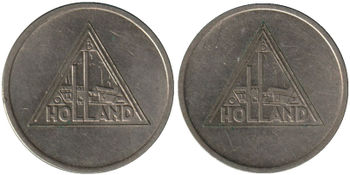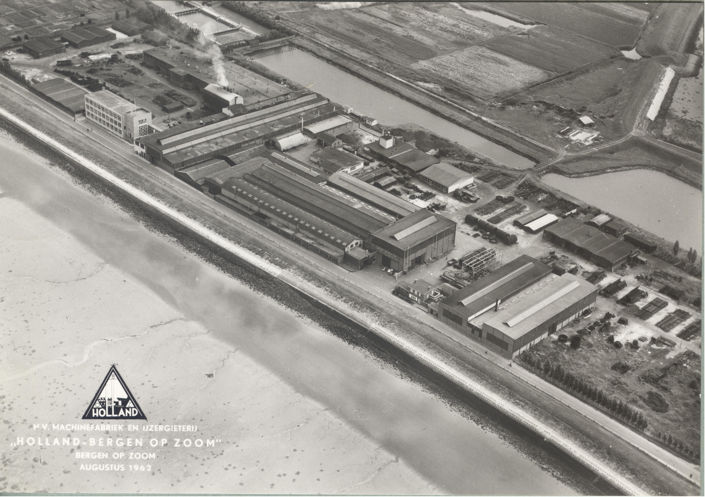Holland logo
In 1905, Alex Nerinx bought a saw mill in Begen op Zoom and converted it to an ironmongery and machine construction factory called N.V. Constructiewerkplaats Bergen op Zoom Alex Nerincx. Increased domestic demand in the first world war led to a move to Havendijk, where expansion was possible. In 1921, the founder died. Due to decreasing turnover, the company considered folding in 1927, only to be rescued by Stork. Stork's facility in Tiel was unable to expand. In 1928, it was moved to Bergen op Zoom and added to the existing plant on Havendijk under the name naam N.V. Machinefabriek en IJzergieterij Holland.
The global economic crisis depressed business, but the plant survived through the deep financial pockets and excellent economic contacts of Stork by investments in new machinery, modernising and ultimately, developing new products. Its own research department was responsible for quality control and innovation.
The second world war was disastrous for the factory. Machines were stolen and buildings damaged. Staff rescued important drawings and data from the archives, though. From 1948, Marshall aid kicked in and the factory could be reconstructed step by step. National economic reconstruction also generated sustained demand for Holland's products.
In February 1953, storms broke a number of dykes in the South-West of the Netherlands, flooding very large areas. Bergen op Zoom suffered and the factory was below three meters of salty water. Amazingly, the factory could be restarted six weeks later. This was followed by an economic storm, caused by European integration and intensified by the discovery of large gas fields in the North of the country that led to a mass move from coal and oil-fired heating to gas-fired heating. Stork, now VMF, tried to switch to light machinery and did not need Holland any more. In 1973, the plant was merged with iron casting and trading competitor Arnoldus Asselbergs & Zonen from Bergen op Zoom. It was renamed N.V. Asselbergs Holland and concentrated on iron casting. Other Asselbergs production facilities were relocated to Havendijk and the plant was thoroughly modernised in 1979. The expenditure left the company vulnerable. It went broke in 1981. The factory was sold to Midland Industries, a British producer of fitting, pressed products and agricultural machinery, and re-named RMI Holland B.V. As Midland Industries in turn drifted into insolvency, the plant went through the hands of several government supported investors, before being closed in 1991. The land has been re-developed.
The photo and practically all information on this page were made available by the foundation for historical research of the industrial patrimony of Bergen op Zoom, Bergen op Stoom
| Holland | ||
|---|---|---|

| ||
| Filename | BZH1 | |
| Side 1 | logo | |
| Side 2 | logo | |
| Manufacture | Copper-nickel | |
| Size (mm) | 22.5 | |
| Weight (grams) | ||
| Notes | ||
| Source | Figleaf | |
